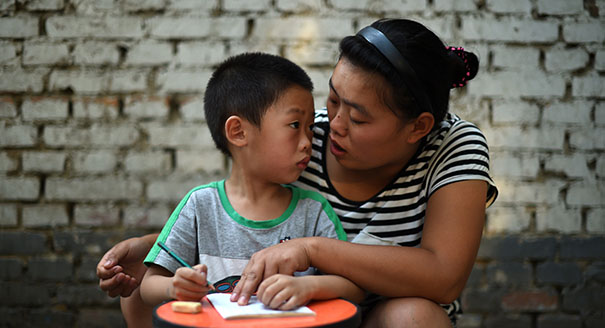Matt Ferchen
{
"authors": [
"Matt Ferchen"
],
"type": "legacyinthemedia",
"centerAffiliationAll": "",
"centers": [
"Carnegie Endowment for International Peace",
"Carnegie China"
],
"collections": [
"China and the Developing World",
"China’s Foreign Relations"
],
"englishNewsletterAll": "",
"nonEnglishNewsletterAll": "",
"primaryCenter": "Carnegie China",
"programAffiliation": "",
"programs": [],
"projects": [],
"regions": [
"East Asia",
"China"
],
"topics": [
"Economy"
]
}
Source: Getty
UN Climate Talks: Is China Still a Poor Country?
China has enjoyed decades of rapid growth, but remains a developing country where urban and rural citizens have vastly different economic opportunities and income levels.
Source: China Dialogue
The answer to whether China is still a poor country is a complicated mix of both yes and no. In terms of overall national wealth, or GDP, China now ranks either number two or number one, next to the United States. But in terms of GDP per capita, China still ranks only around number 90, reflecting China’s huge population and how far removed the average Chinese citizen’s lifestyle is from those in wealthier countries in North America and Western Europe.
Even within China itself, the answer to this question is complicated by the vast differences between those who live in the wealthier cities near the eastern coast and those who live in less affluent inland or rural parts of the country. Add to this the differences in income and lifestyle between those with the opportunity to get into the best universities, to get the best jobs in government or in business and those without such opportunities and the range of who in China is poor and who is middle class and who is rich only expands.One area where there is less debate about whether or not China is “poor” is in China’s identity on the world stage. In its foreign relations, China’s leaders have unequivocally chosen to represent China as a “developing county”. Being a developing country may not be exactly the same as being a poor country, but it certainly signals that China is a country that is not as wealthy or powerful as it would like to be.
China’s official foreign policy framework is laid out most clearly in the 2011 State Council white paper called “China’s Peaceful Development”, the title of which emphasises China’s status as a developing country and its overriding concern to continue to pursue its development aims in a way that help build and sustain a peaceful global environment. Granted, China’s developmental gains since the beginning of the Reform and Opening period in the 1980s mean that the country is vastly wealthier at home and more influential abroad than it was back then and the country’s leaders seek commensurate respect for China as a “great power” or 大国.
Even though it is clear that China’s leaders and certainly most of its people clearly identify China as a developing country, greater wealth and influence are common aspirations for the vast majority of Chinese. Not only is China’s developing country identity a source of contradiction at home, but abroad it also can create confusion. In developed countries such as the United States, many see China’s headline growth and GDP figures and see an increasingly wealthy and powerful competitor, not the poorer and weaker China of much of the past two centuries. And even in other regions such as Africa, Latin America or even Southeast Asia where there is a certain sense of admiration for China’s developmental achievements, leaders and people there see China as an increasingly rich and powerful nation.
About the Author

Former Nonresident Scholar, Carnegie-Tsinghua Center for Global Policy
Ferchen specializes in China’s political-economic relations with emerging economies. At the Carnegie–Tsinghua Center for Global Policy, he ran a program on China’s economic and political relations with the developing world, including Latin America.
- How China Is Reshaping International DevelopmentQ&A
- Why Unsustainable Chinese Infrastructure Deals Are a Two-Way StreetArticle
Matt Ferchen, Anarkalee Perera
Recent Work
More Work from Carnegie Endowment for International Peace
- The Gulf Monarchies Are Caught Between Iran’s Desperation and the U.S.’s RecklessnessCommentary
Only collective security can protect fragile economic models.
Andrew Leber
- Duqm at the Crossroads: Oman’s Strategic Port and Its Role in Vision 2040Commentary
In a volatile Middle East, the Omani port of Duqm offers stability, neutrality, and opportunity. Could this hidden port become the ultimate safe harbor for global trade?
Giorgio Cafiero, Samuel Ramani
- Governing Aging Economies: South Korea and the Politics of Care, Safety, and WorkPaper
South Korea’s rapid demographic transition previews governance challenges many advanced and middle-income economies will face. This paper argues that aging is not only a care issue but a structural governance challenge—reshaping welfare, productivity, and fiscal sustainability, and reorganizing responsibilities across the state, private sector, and society.
Darcie Draudt-Véjares
- Beijing Doesn’t Think Like Washington—and the Iran Conflict Shows WhyCommentary
Arguing that Chinese policy is hung on alliances—with imputations of obligation—misses the point.
Evan A. Feigenbaum
- China Is Worried About AI Companions. Here’s What It’s Doing About Them.Article
A new draft regulation on “anthropomorphic AI” could impose significant new compliance burdens on the makers of AI companions and chatbots.
Scott Singer, Matt Sheehan









